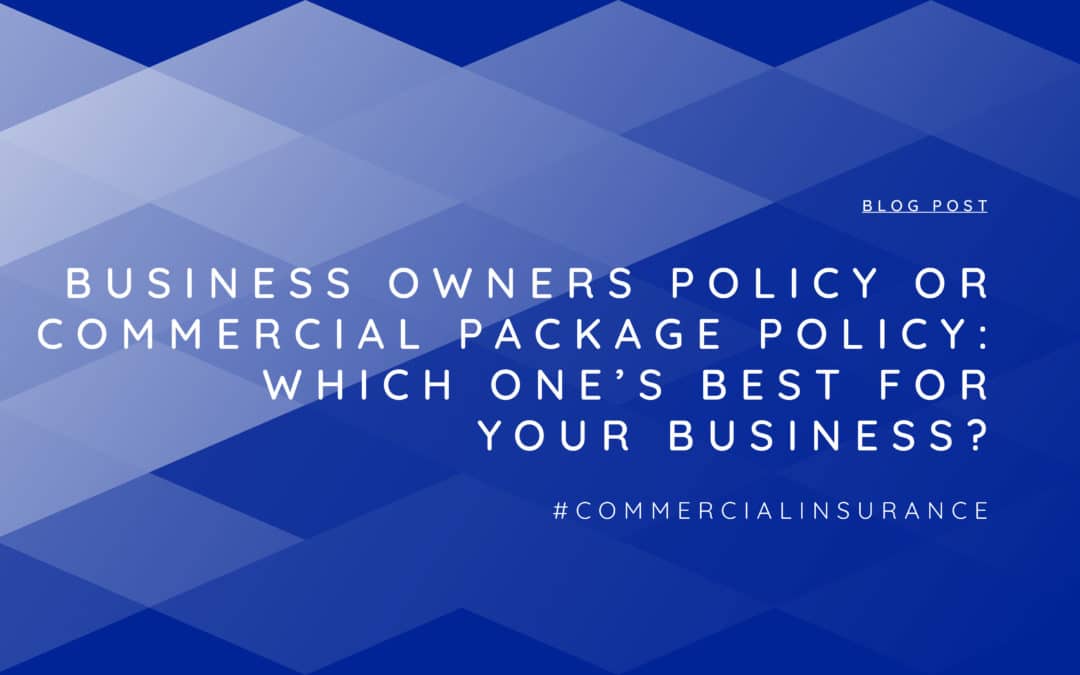If you’re a small business owner, you’ve got plenty on your mind. That’s why a business owners policy (BOP) may make sense for you. It takes the guesswork out of buying commercial insurance.
Almost every business needs some form of insurance coverage. This includes commercial general liability (CGL) and commercial property insurance. You may also need business interruption, or business income, insurance.
A BOP bundles into one policy the property and liability protections that are essential to running a small business. On top of that, the premiums are less than what you would pay to purchase these coverages separately. Think of it like a restaurant menu where you can buy individual coverages à la carte or order a combo that includes a set group of coverages at a lower price.
A commercial package policy (CPP) also bundles business insurance, but it lets you choose which types of coverage you want in your package. You may not need everything in a BOP, or you may want other types of insurance not included in a standard BOP form.
With these two key differences in mind – that BOPs are standardized and CPPs give you more flexibility – let’s take a closer look at what’s included in these policies and why you might benefit from one over the other.
BOP: good for when you’re starting out
BOPs provide three main coverages:
- Property insurance for a building and contents owned by your business.
- Business interruption insurance. This covers the loss of income resulting from a catastrophe (such as a fire, for example) that disrupts the operation of your business. It can also include the added expenses of operating out of a temporary location.
- Liability protection. This covers your company’s legal responsibility for harm it may cause to others. It can include things you and your employees do or fail to do that cause property damage or bodily injury via improper installations, defective products or mistakes.
BOPs don’t include professional liability, auto, workers compensation, or health and disability insurance. You’ll need separate policies for these coverages.
Not all businesses qualify for BOPs, and insurers vary in their requirements. Underwriters typically look at business size, location, revenue and class of business.
You may be able to add to your BOP
While BOPs may be limited in what they offer, some insurers will add coverages or increase policy limits through endorsements if you need additional protection. These might include vehicle, flood, computer equipment, crime, fidelity bond, mechanical breakdown, and spoilage of merchandise. In essence, you are purchasing extra coverage on top of what the BOP provides. However, you cannot drop coverage that is part of the basic BOP form.
BOPs also have a special property insurance form that provides more comprehensive protection. A standard BOP offers named-peril coverage for your property. This means that only the types of events specified in the policy would be covered (fire, explosion, wind damage, vandalism, etc.). A special BOP form offers “open-peril” coverage, giving you added protection. Keep in mind, even open-peril plans will have exclusions.
For businesses just starting out that have limited property and liability coverage needs, a BOP may make perfect sense and be the most cost-effective purchase. Small contractors, retailers, barbershops, apartments and office buildings are some businesses typically insured by a BOP.
Talk to an insurance broker who works in the commercial market about what’s best for your business. The key is to at least have some basic protections in place for your company.
Commercial packages can meet your growing needs
As your company grows, you may find that you need more protection than a BOP can offer. Larger businesses or firms that operate in a specialized field may be better off with a CPP since it allows you to tailor the coverage to your needs.
CPPs provide a high degree of customization, allowing you to combine the coverages you choose into a single policy. Like a BOP, the core of a CPP will be protection against property and liability exposures. But you can also add commercial auto and many other types of insurance, such as umbrella liability, business interruption, employment practices liability, builders risk, inland marine, crime protection, cyber risk, professional liability and pollution liability.
The appeal of a CPP is that you can design your own coverage and drop some of the coverages that are standard in a BOP that you might not need. However, some types of coverage can’t be added to a CPP, including workers’ compensation, directors and officers (D&O), errors and omissions (E&O), group life and disability income.
Some insurers offer CPPs for specific types of industries to cover their unique needs, such as schools, churches, restaurants, light and heavy manufacturing and health care providers.
Something is better than nothing
Starting up and running a small business isn’t easy, and purchasing insurance may not seem like a high priority. But can you afford the expense of a lawsuit, an injury, or significant property damage? In today’s litigious society, going without coverage to protect your business and employees could be a recipe for disaster.
Talk to an insurance broker about a policy that’s right for you. In addition to a BOP or CPP, you may need to purchase other types risk protection for your business. We can design a complete insurance program that covers all your business and personal needs.

